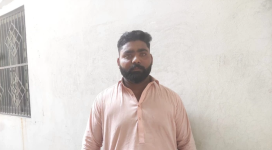BANTUL, Indonesia - Villagers pleaded for food and shelter Thursday in areas yet to be reached by foreign relief teams five days after Indonesia's devastating earthquake. Survivors searched for scraps of tin and other materials to rebuild destroyed homes. Others blocked traffic to plead for money or placed flower pots and trash cans on streets to slow traffic and beg for donations.
"We are forced to do this because the only aid we've received is a bit of food and some cooking oil," said Ribut Setyo Pambudi, 17, after stopping a bus. "We don't have any money to rebuild, to buy gasoline or even to go out to try to find work."
Foreign aid workers have poured into the region, scrambling to provide shelter, food and health care to more than 600,000 people displaced by the quake.
Officials in remote corners of hardest-hit Bantul district reported 388 additional deaths after phone lines were restored and roads and bridges were repaired, said Andi Hanindito, a Social Affairs Ministry official.
That raised the death toll from Saturday's 6.3-magnitude quake on Java island to 6,234.
In the village of Topriaten, survivors said they had only received a single bag of rice from local authorities for 140 people. Only a few houses survived the quake, but no tents had arrived, forcing scores of villagers to live beneath makeshift tarps.
"I don't know why no one has come yet," said Jemingin, 46, the village elder who, like many Indonesians, only uses one name. "We're not far from the city but it seems we're being ignored."
The earthquake reduced more than 135,000 houses to piles of bricks, tiles and wood in less than a minute, displacing an estimated 647,000 people.
Many are living under plastic sheets near their former homes, in rice fields or on roadsides, their misery compounded by days of intermittent rain and blazing sun. Others are staying with relatives or friends.
"There are many who are hungry here," said Warjono, sitting beneath a flimsy canvas tarp in front of a sign that read: "Wirokerten village desperately needs your help."
"We got some government aid, but it wasn't divided equally, and I got very little," he said.
Days after the quake, patients occupied every available spot in Bantul's hot, dirty hospital. The stench of urine and trash wafted through the main hall, where more than 150 victims lay on the floor inches apart, a cracked roof overhead.
Many still wore the clothes they had on when the quake struck.
Several foreign militaries have contributed to the relief effort, with Japan announcing Thursday it was dispatching 140 troops to provide medical assistance, supplies and other humanitarian support. They were expected to arrive by Friday.
Dozens of U.S. Marines were providing care at a portable field hospital on a soccer field in the town of Sewon, the latest of several American relief missions in predominantly Muslim nations. Despite the tragic circumstances, one U.S. Marine said the current relief effort could serve as a cultural bridge.
"When you help people, you become friends," said 1st Lt. Eric Tausch, from a U.S. Marine division based in Okinawa, Japan.







